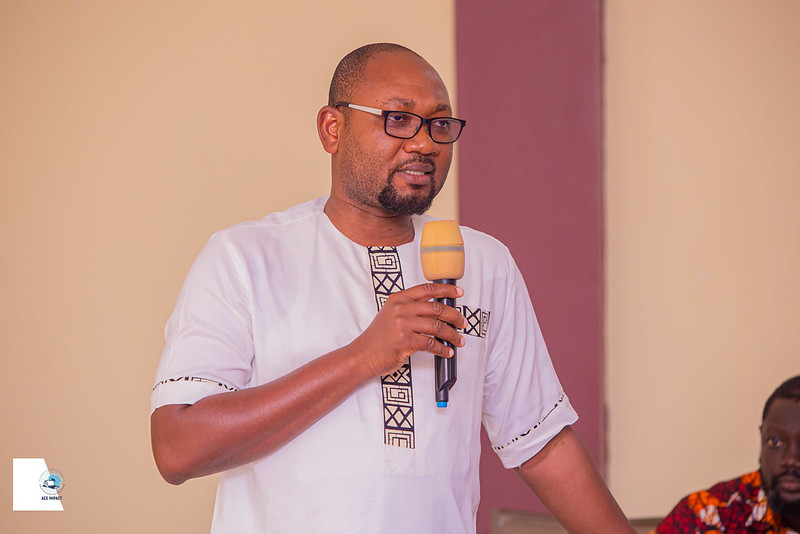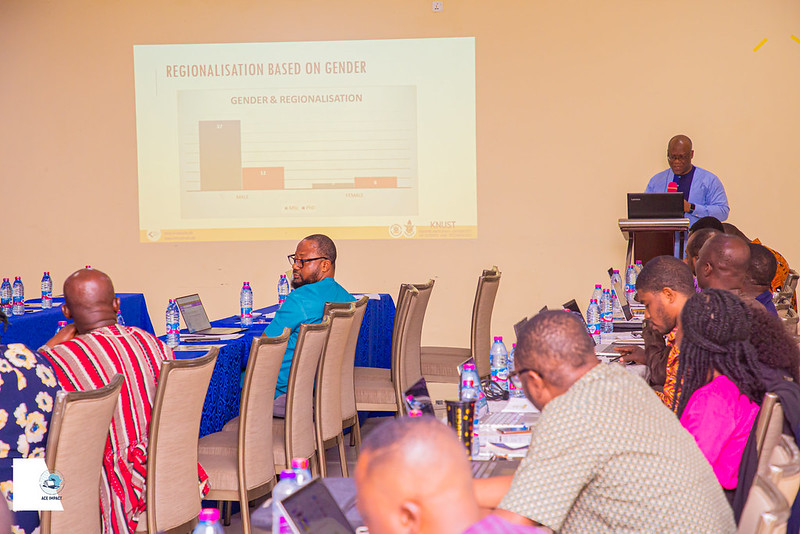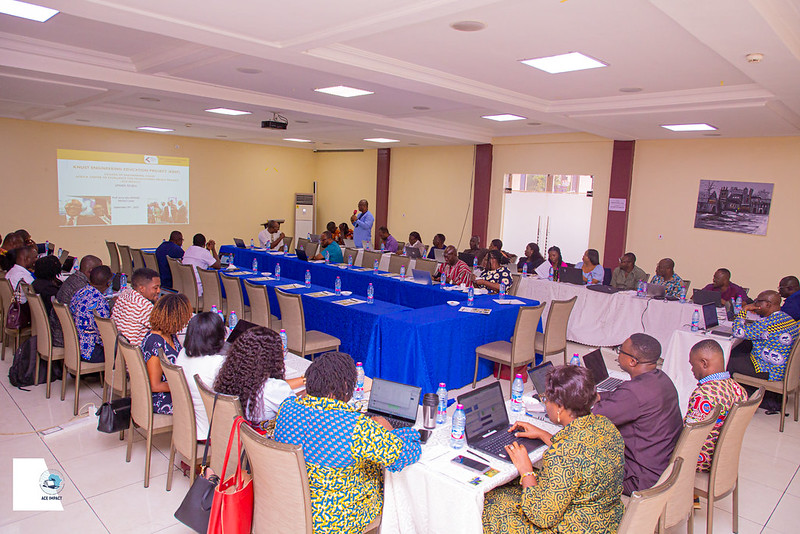The National Facilitation Unit Organised an ACE Country Review Meeting at Tomreik Hotel
World Bank Senior Education Specialist and Country Task Team Leader for the Africa Higher Education Centres of Excellence for Development Impact (ACE Impact) project in Ghana, Mrs Eunice Ackwerh has emphasized the importance of showcasing the outstanding achievements of ACE Impact centers in the country. Mrs. Ackwerh made these remarks during the country's review workshop on Friday, September 29, 2023, at the Tomreik Hotel in Accra.
The ACE Impact project, initiated by the World Bank and implemented by the Association of African Universities (AAU), aims to enhance the quality and quantity of higher education in Africa. Championed by 53 centers across 10 West African countries and Djibouti, measures its success against various indicators of Project Development Objectives, including enrollment, accreditation, research publications, community engagement, resource mobilization, and practical student internships. To assess progress, bi-annual national review meetings are organized to provide a platform for center leaders and other key stakeholders to discuss the project's achievements, operational challenges, and strategies to address them.
During the workshop, the nine Ghanaian centers of excellence reported several remarkable achievements, exceeding their targets. These accomplishments include groundbreaking research publications, advanced technologies and innovations, infrastructural development, valuable partnerships, national and international accreditations, effective revenue mobilization, gender-balanced enrolment, and international awards and recognitions.
However, despite their high female enrolment rates, the Ghanaian ACEs have struggled to attract students from other African regions, a critical aspect of the project's success. The low international enrolment has been attributed to high tuition fees and additional costs not covered by scholarships. Mrs. Ackwerh suggested a sustainable solution to this challenge, emphasizing that the value of the programs offered by these centers should be clearly communicated to prospective students and other relevant audiences.
Mrs. Ackwerh urged the centers to emphasize the value of their programs and make their achievements more visible through their websites and other communication platforms. She cited Ashesi University as an example, where international students are willing to pay higher fees because they recognize the value of the programs. She encouraged centers to leverage their success rates to attract more international students, emphasizing that this aspect would be crucial for the project's next phase.
Mrs. Ackwerh also highlighted the importance of attracting foreign students, along with other key indicators like procurement, internship, and construction, in determining the continuation of the ACE program. She called upon host universities to support the centers in student financing and other relevant aspects to ensure the project's sustainability.

On his part, Dr Edmund Aalangdong, Head of Policy and Planning and Focal Point for the National Facilitation Unit at Ghana Tertiary Education Commission, commended the centres, especially for their remarkable progress and continuous efforts towards advancing excellence in research and innovation. Dr Aalangdong therefore urged centers to continue to strive to achieve even more and sustain their successes. According to him, it is only when those gains are consolidated that their impacts will be meaningful. The national review meeting, organized by the National Facilitation Unit of the Ghana Tertiary Education Commission, also provided an opportunity for participating centres to plan for their sustainability as the project nears its conclusion. Dr. Sylvia Mkandawire, Senior Project Manager of ACE Impact, encouraged centers to work on ensuring project continuity beyond World Bank funding. This includes establishing endowment funds, seeking grants, brokering research and training contracts, offering short courses and consultancy services, and forming partnerships with government and private institutions.
Furthermore, the workshop served as a platform for networking and collaboration among centers, and to update stakeholders on the upcoming 10th regional workshop scheduled for October 31 to November 3, 2023, in Abidjan, Cote d’Ivoire. The nine Ghana centres of excellence are hosted by five universities. The are: West Africa Genetic Medicine Centre (WAGMC), the West African Centre for Crop Improvement (WACCI), and the West Africa Centre for Cell Biology of Infectious Pathogens and Non-Communicable Diseases (WACCBIP + NCDS), all at the University of Ghana, Legon, Accra. Others include the KNUST Engineering Education Project (KEEP), Regional Transport Research Centre, Kumasi (TRECK), and Regional Water and Environmental Sanitation Centre, Kumasi (RWESCK), all hosted by the Kwame Nkrumah University of Science and Technology, Kumasi. The remaining Ghana ACE centers are the Regional Centre for Energy and Environmental Sustainability (RCEES) at the University of Energy and Natural Resources, Sunyani; the African Centre of Excellence in Coastal Resilience (ACECoR) at the University of Cape Coast, Cape Coast; and the West Africa Centre for Water, Irrigation, and Sustainable Agriculture (WACWISA) at the University for Development Studies, Tamale.


